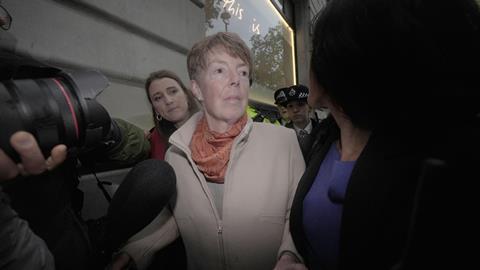Paula Vennells, the chief executive of Post Office Limited from 2012 to 2019, makes her long-awaited appearance before the public inquiry, for the first of three days of questioning
4.35pm: She was so close to getting through to the finish, but Sir Wyn Williams wants a final question. He asks of the briefing note to the select committee: 'You were being advised to be very precise, circumspect and guarded about what you said. You would agree?'
Vennells: 'Yes.'
Williams: 'That was the effect trying to be created by those creating that document?'
Vennells: 'It could be.'
Williams: 'Why?'
There follows a long pause where Vennells is again brought to tears. After a minute or so, she recovers herself and replies: 'I could be too trusting of people. I took the information I was given and went into a select committee. From what I know now it may be other people knew more than I did and they were trying to direct me to answer in a certain way.'
And with that, we break for the night. We will all be back from 9.45am tomorrow.
4.30pm: Beer pushes on. How could Vennells possibly believe by 2015 - after separate reports in 2011 and 2014 casting doubts on the position - that remote access was not possible?
Vennells says: 'I had no idea at any time that a balancing transaction could be used in the multiple ways it was. By the time I got to the committee and got a briefing in the morning or overnight, I did not reach a conclusion that meant I was giving inaccurate information to the select committee. That is not something I would have done.'
4.20pm: The inquiry sees briefing notes prepared for Vennells in advance of her committee appearance, particularly on the issue of remote access. It states that she should volunteer certain answers only 'if pushed'. Vennells maintains she approached the committee with an intention to answer questions as openly and honestly as she could.
'Whatever anybody asked me I would only tell the truth,' she adds.
4.05pm: We move on to Vennells' appearance before the business select committee in 2015 and this now-infamous email sent to the head of IT and head of PR in advance.
Beer asks why it was necessary to request lines showing that remote access was not possible, rather than simply ask if it was possible.
Vennells' response is difficult to follow. She says Post Office chair Alice Perkins had once advised her that if she wanted information she should give the answer to a question and ask for why that is the case. Then she explains: 'I was not in any way trying to tell them what the answer should be.'
Beer looks aghast and says what she is saying does not make any sense.
Vennells says: 'It is trying to get them to phrase something in a way that said from my understanding "this is what it should be". I had been told all the time [remote access] was not possible and I wanted to be able to explain to the select committee that it was absolutely not the case.'
4pm: Beer says the inquiry has been told it was like the 'wild west' such was the access that Fujitsu had to amend transactions. Vennells says she should have been shown documents at the time which proved this. She also admits that it was decided not to retrieve relevant data that might have exposed remote access as it would cost a 'six-figure sum'.
She says it was 'deeply regrettable' that more information was not shared with her.
3.55pm: The inquiry sees a 2014 report from Deloitte confirming that Fujitsu could alter branch transactions without the approval of a sub-postmaster. This was a year before Vennells told a parliamentary select committee that remote access was not possible.
Vennells says she was reassured by the head of IT that this was not an issue.
'Once it had been explained to me I accepted the explanation and moved on,' she says.
3.25pm: A board briefing is touched upon by Beer which again raises the issue of remote access. Vennells says others in the organisation were less concerned about this and she was reassured by head of IT Lesley Sewell that remote access to branch accounts was an emergency measure and only ever used once. Beer says we shall return to this after a short break.
3.10pm: We have moved onto the issue of remote access, and specifically Vennell's knowledge of it.
The inquiry sees a letter from Ernst & Young's audit in 2011 which stated categorically that unauthorised and erroneous transactions were able to be made. Essentially confirming that remote access to branch accounts was possible.
Vennells says she was 'not unduly concerned' upon reading this and that it was the first time she had encountered an audit report. Beer asks: 'It is implicit here that remote access by Fujitsu is possible?'
Vennells: 'Reading that today with everything we know, absolutely. I am not sure at the time I would have understood that.'
3pm: Mood starting to turn here as groans come out of the public gallery when Vennells says she does not recall her response to another McCormack email (see below). This had made clear there was 'clear and unquestionable evidence of an intermittent bug in Horizon'.
The Post Office appears to have done little to respond to McCormack. When he continued to contact Vennells and her colleagues, the Post Office ceased correspondence with him. Post Office solicitor Rodric Williams told the communications chief that McCormack was a 'bluffer who keeps expecting us to march to his tune'. Vennells says she doesn't believe McCormack was a bluffer.
Did Vennells not spot a pattern with the many people telling her there had been miscarriages of justice?
'I saw the theme of Horizon coming up,' she says. 'I believed the dots were being joined up by the investigation work in the complaints and mediation schemes. In every case I believed we had looked at it in some detail. I regret that clearly neither of those exposed the issues.'
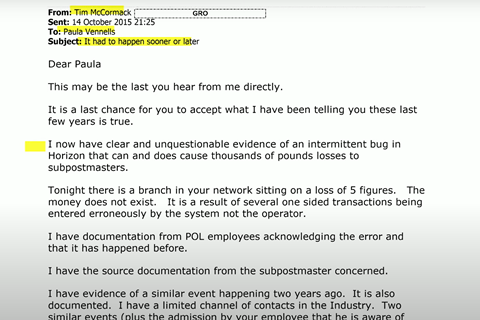
2.50pm: An internal email from March 2015 shows Vennells telling colleagues that the Post Office should be on the alert for calls and warning about avoiding ‘any unnecessary noise of reference to Horizon’.
Vennells says she regrets her choice of words. Beer says she is not the only one who feels that way.
Beer then takes her to the suggestion that sub-postmasters were told they were the only ones experiencing problems.
‘Was there a strategy to divide and conquer sub-postmasters to say "you are the only person who has got this problem, pay up, it’s in your contract"? asks Beer.
Vennells replies: ‘No, I never came across that at all.’
2.45pm: Inquiry sees an email from Chesterfield MP Toby Perkins. He explains the situation of his constituent Harjinder Butoy, who was convicted on 10 counts of theft and jailed for three and a half years. He was made bankrupt and had his reputation ruined.
Crucially, Perkins flagged up to Vennells that Butoy believed he had been the victim of the faulty Horizon system.
Vennells says she may not even have seen this letter, saying there was no system for making her aware of these types of correspondence and that it would often depend on whether a letter had been left on her PA's desk.
2.30pm: More embarrassment for Vennells as the inquiry sees an email from Tim McCormack in 2014, warning that Horizon was faulty and she was being badly advised.
Vennells says Post Office litigation solicitor Rodric Williams told her not to engage with McCormack.
Vennells now says: 'I am very sorry. Tim McCormack had an insight into the lesson of me being too trusting. The comments he makes in this, with hindsight, ring true and are hard to see again.'
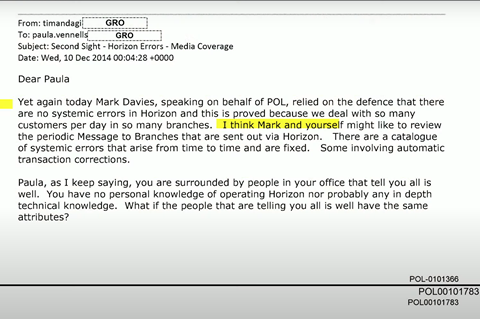
2.25pm: We're back, with discussion about the terms of sub-postmasters' contracts and whether they were required to cover any shortfall on branch accounts. Vennells appeared to say this in correspondence when she was chief executive.
She does not recall where this assumption came from, although Beer points out that as network director from 2007 to 2012 she would have had responsibility for contract managers.
Vennells says: 'I trusted this was a process that had been in place for many years and run by an experienced team.'
1.20pm: Beer really pressing this point now: how could Vennells go in 18 months from being disturbed to hear about sub-postmasters and their tragic cases, to shutting down the mediation scheme and ultimately denying there had been any wrongdoing for years to come.
Beer asks: 'Did the Post Office use a system of tactics and systems to iron away these very disturbing complaints over the next 18 months?'
Vennells replies: 'That was not my understanding.'
Beer again: 'How was it that what struck you as disturbing complaints ended up as being without substance?'
Vennells, in tears again, says: 'My understanding was that every complaint was looked at in detail. Information from Fujitsu was sought, data was looked at and Second Sight - know this sounds very hollow now - complimented the Post Office on the standard and detail of the investigation. It is completely unacceptable and deeply sad that we didn't reach the right conclusion on these cases.'
We go to lunch.
1.10pm: Inquiry moves to an email sent in October 2013 from Second Sight's Ron Warmington, where he sent eight examples of cases where shortfalls were wrongly attributed to sub-postmasters and the devastating impact on victims and their families. There were also details included by Warmington of complaints about training and the Horizon helpline, as well as the approach of investigators.
Vennells emailed in reply: 'Apart from finding [the cases] very disturbing (I defy anyone not to) I am now even better informed.'
Beers asks what changed between her saying this and the Post Office shutting down the mediation scheme.
Vennells cries for a third time today and says it was an act of 'compassion'.
Vennells confirms she was not shown this analysis by general counsel Chris Aujard and two other senior staff members Angela van den Bogerd and Lesley Sewell. Beer suggests this shows that the trio had kept information from her.
Vennells says: 'I was not under the impression people were withholding any information from me. This is a report that should have gone to the group executive... I find it very strange.'
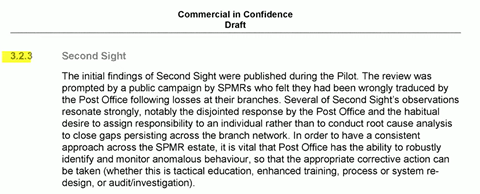
12.25pm: Beer asks whether Vennells ever thought to ask head of security John Scott why there was a team of 100 people in the organisation investigating people for more than five years. This prompts laughter in the room, but Vennells still insists she did not know and assumed prosecutions were brought by external authorities outside the Post Office.
We go to another quick break.
12.20pm: Vennells coming under huge pressure to explain this assertion that she did not realise the Post Office carried out its own investigations and prosecutions until 2012. 'It had been going on for so long that it was an accepted reality,' she says. 'It was a status quo when I joined and accepted.'
Sir Wyn Williams makes a rare intervention to press this point, noting that the high-profile Seema Misra trial was in 2010 and it is 'extremely surprising' that this did not filter through that the Post Office had prosecuted her.
Vennells says it was 'completely unacceptable' that she didn't know.
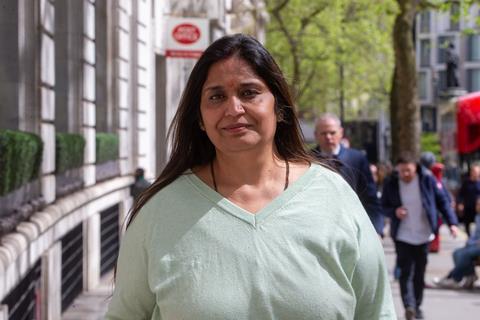
12.10pm: Beer asks Vennells when she knew that the Post Office conducted its own investigations and prosecutions. She says this was not until 2012.
The inquiry then sees notes from a meeting in 2008 where it was said that the Post Office trainee investigators were 'performing solidly'. 'Who did you think was doing the investigating? asks Beer, who says it was 'openly discussed' that the Post Office was conducting its own investigations.
Vennells says that it is a reasonable inference and she should have known and asked more questions. 'When I joined Royal Mail in 2007 it was an organisation in which postmasters were investigated and I now know prosecuted by the organisation. It was a historic reality and it became a continued reality and I simply joined that.'
She continues to say she did not know that Post Office conducted criminal investigations until 2012.
11.55am: We go back to the start of Vennells' career at the Post Office. She joined in 2007 and points out that she could therefore not have signed off on the £300,000 spending on legal costs for the 2006 case against Bridlington sub-postmaster Lee Castleton. This had been alleged by another witness last month.
11.50am: Beer points out that Vennells only seems to have clear recollections where they 'exculpate' her from blame. This, he suggests, has been the same for many former Post Office leaders who have appeared at the inquiry.
'Was there a systemic issue that people only looked to the good and forgot the bad?' asks Beer.
Vennells replies: 'No. I give you my word that I will respond in complete truth to this inquiry and have done in my statement.'
11.45am: The inquiry looks at Vennells response to the news that Martin Griffiths, a sub-postmaster hounded for repayments by the Post Office, had stepped in front of a bus in 2013. He would later die from his injuries. Vennells speculated in an email to Crichton there were 'usually several contributory factors' when someone has attempted suicide.
In a later email, she said she had 'heard... that there were previous mental health issues and potential family issues'.
She starts to try to explain her comments here, but stops herself and says: 'I simply should not have said it. I shouldn't have used those words.'
Beer suggests she was already trying to counter the suggestion that Post Office was to blame. She denies this.
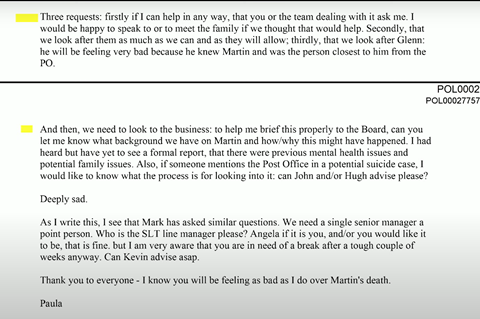
11.25am: We're back, and discussing the assertion Vennells made to MPs that the Post Office never lost a prosecution based on Horizon evidence.
She states this belief went back to a board meeting in January 2012 where Susan Crichton said the Post Office effectively had a 100% hit rate. 'That was completely inaccurate in many different ways,' Vennells now tells the inquiry.
'If you are given information by the highest lawyer in the organisation, you take it completely as the truth. You assume that lawyers - and I must be clear I am not implying anything in terms of Susan Crichton - but one assumes that lawyers work to a professional code. The Post Office didn't have sufficient oversight to check.'
The inquiry has previously heard Crichton say she received her information about success rates from in-house solicitor Jarnail Singh.
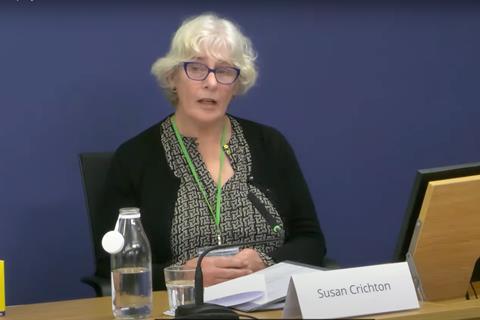
11.05am: For the first time, Vennells cries during her evidence when she is taken to her 2015 responses to MPs, saying there had been no miscarriages of justice when this was ultimately incorrect. She says the Post Office knew more than she was being told. The inquiry sees briefing notes which did not mention anything regarding 'temptation' being an issue, or that some sub-posters had been borrowing money from the till, as Vennells later alleged. Were you freestyling in the meeting, asks Beer.
Vennells repeats that she did not know all the details.
Then a rare comedy moment as chair Sir Wyn Williams interrupts to say he is being dripped on. Beer says he doesn't want to indulge in water torture so we take the first break.
10.55am: Beer asks if Vennells feels like she was protected by colleagues from knowing too much information about what was really happening. She says this was not the case. But she does point out that former general counsel Susan Crichton had told the inquiry that the practice was not to disclose legal advices to her. These advices should have been shared, she says.
10.45am: Huge embarrassment for Vennells as the inquiry sees an email from her in 2015 to general counsel saying 'our priority is to protect the business'.
Vennells says she also prioritised those saying the Horizon system didn't work. Beer points out she may have thought that but she didn't write it.
She says the Post Office had spent three years investigating the system and whether anything had gone wrong.
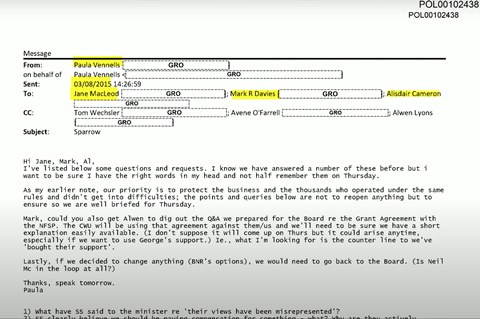
10.35am: Beer takes Vennells to her closing sentence in her witness statement where she says that 'lives were torn apart by being wrongly accused and wrongly prosecuted as a result of the Horizon system'.
Beer asks whether this shows that even after all this time she still believes this was just an IT issue, suggesting it was a 'perpetuation of a culture that ran through the Post Office of failing to take responsibility' for what happened. Vennells says her statement was a 'poor choice of words' and that she understands this scandal was far more complicated than just the Horizon system.
10.25: Silence in the room as the inquiry is shown a text exchange earlier this year between Vennells and former Royal Mail chief executive Moya Greene.
'I think you knew,' Greene told her. Vennells denied it. 'I want to believe you... I was afraid you were being lied to.'
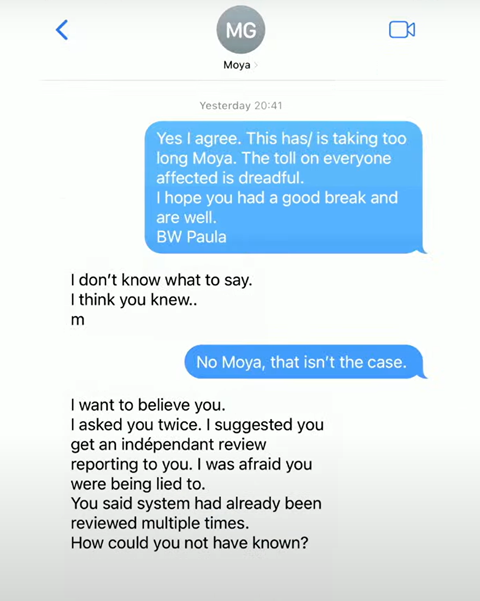
10.15am: Vennells says legal advice from barristers Simon Clarke and Brian Altman KC was commissioned and produced, but never presented in full to the board. Instead she and other directors were only told about the outcomes of these advices. Vennells says there was 'too much reliance' on general counsels at the Post Office to take decisions about what should be shared from legal advices.
'What happened is they were then reproduced into board documents which were shared, but the original advice would have been so much more useful,' she adds.
10.10am: Beer asks: Was there a conspiracy lasting 12 years involving a wide range of people to deny you information?
Vennells: I don't believe that was the case... my deep sorrow in this is that I think that individuals - myself included - didn't see things, didn't see things. I may be wrong but that was not the impression I had at the time. I have more questions now but conspiracy feels far-fetched.
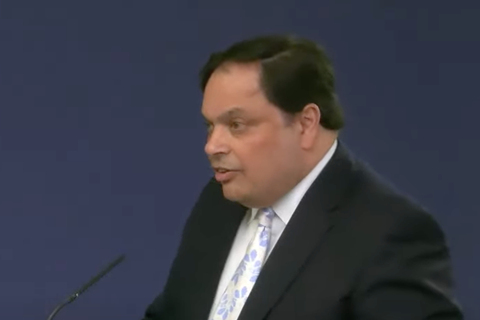
10am: Vennells' first witness statement is the longest produced by any participant, running to 775 pages. Vennells says she did not see the Simon Clarke KC advice (produced in 2013 giving details of Horizon bugs and attempts to shred minutes of meetings) until 2021. This will prove crucial on the subject of what she knew and what she did in response.
9.55am: A blistering start. Inquiry counsel Jason Beer KC starts by asking whether Vennells was the unluckiest chief executive in the UK. She replies: 'There was information I was not given... One of my reflections is that I was too trusting. I did probe and did ask questions and I am disappointed where information was not shared.'
There was speculation before her appearance that Vennells might seek to blame her lawyers and advisers for some of her actions in response to the Horizon crisis. Her opening response would suggest she may well do.
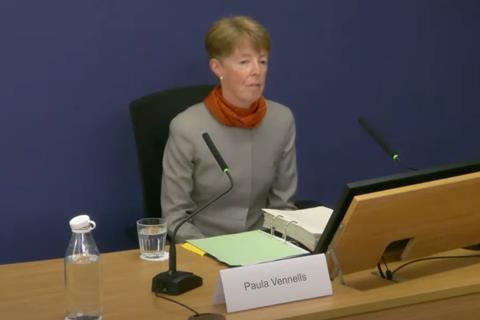
9.45am: Vennells enters the hearing room. An eerie silence as she comes in, with sub-postmasters observing an immaculate silence. Sir Wyn Williams, who is here in person, gives his usual direction about self-incrimination and that she does not have to answer any question where there is a risk that she might incriminate herself.
9.30am: The excitement and tension in the hearing room is palpable as we wait for Vennells to arrive. Media had to apply weeks ago for a coveted spot in the room and they are amassed at the back. Inquiry counsel Jason Beer KC strides in with his team. Perhaps 100 or more sub-postmasters have filled the public gallery and many greet each other like old friends, no doubt having sat through plenty of court and inquiry hearings together. Vennells, who was jostled by the media on her arrival, is on from 9.45am.
9am: A mass media gathering outside Aldwych House for perhaps the most anticipated news story of the year. Media outlets had to apply weeks in advance for a golden ticket to sit inside the hearing to hear what Paula Vennells knew about Horizon failings and what she did in response to that knowledge. It promises to be a fascinating three days. While the Post Office scandal is a national story, it has a particular relevance for the legal profession, as we explain here.























